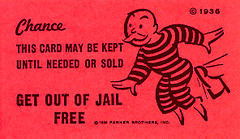Every day in my practice I deal with the federal sentencing guidelines and the harshness of mandatory minimum sentences. I practiced for over a decade before the guidelines were enacted in 1987 and I've practiced for two decades since. I spent much of the 1990's unsuccessfully lobbying Congress to repeal mandatory minimum sentences. I know how unfair the system is.
Monday, before the Libby commutation was announced, I spent the day writing two sentencing briefs for clients. One involved a ten year mandatory minimum sentence for a non-violent offense in which the Judge has no authority to impose a lesser sentence. He can only go higher because the guideline range is higher than the ten year mandatory minimum sentence. Talk about a downer, this was it.
In the other case, I asked for a below-guidelines sentence, now allowed under the Supreme Court's decision in Booker, which rendered the guidelines advisory rather than mandatory. I painstakingly researched the latest cases in the District and across the country, framed and re-framed my argument to put my client's personal history characteristics in their best light, re-read and quoted from almost two dozen heart-felt letters from family members and others asking that my client be spared jail and placed on home detention or probation because of his life-time of good works and lack of prior criminal record and because of how much his family depended on him.
When I was done with both briefs, I felt satisfied. I had put my brain and heart into the briefs and done what I could and now it was up to the Judge. That's how the system works. It's called the law. I may not agree with the guideline sentencing ranges or mandatory minimum sentences and I may disagree with the Probation Department's calculations, but I make my arguments based on the law and the facts and let the Judge decide. If I think the Judge makes the wrong call, I appeal to the Circuit Court of Appeals.
After filing my briefs, I went online and learned that just hours after the D.C. Court of Appeals ruled that Scooter Libby would have to go to prison while his appeal was pending, President Bush, with the stroke of a pen, wiped out Libby's prison sentence. He didn't reduce it. He eliminated it.
Why? Because in his view, the sentence was too harsh. He thought the Judge calculated Libby's guidelines at too high a level. He thought the Judge should have granted Libby a departure from the guidelines. Because he disagreed, because he is President, because Scooter Libby is in his elite circle, he threw the law out the window. He didn't reduce the sentence to a lesser term of imprisonment. He didn't wait for the Court of Appeals to decide if Judge Walton was right or wrong. He didn't wait for the system to run its course. Instead, because he didn't want Scooter Libby to spend even a single night in prison, he intervened and set Libby free.
He made this decision just weeks after he had the Attorney General send his minions to Congress to argue that every federal offense should carry a mandatory minimum sentence from which a Judge cannot depart. In other words, for every other defendant in America, Bush wants to preclude judges from exercising discretion and require them to sentence according to a mathematical formula. Libby, on the other hand, gets a free pass because the Judge didn't exercise the discretion Bush thinks Judges in other cases ought not to have.
With that one stroke of the pen, Bush trivialized and rendered meaningless the hard work of Judge Walton, the D.C. Circuit Court of Appeals, the prosecutors and the probation officer. He told them it didn't matter how much time they spent analyzing the facts or the law or even whether they were right or wrong. He could care less what the law held. He thought differently and that's all that mattered.
For every other defendant, prosecutor, judge and defense lawyer around the country, his action says something more: The law doesn't apply if the defendant has a good enough connection to the President -- and only if the defendant has a connection to the President.
Every other defendant be damned. Their families and children can suffer, their lifetimes of good works can be overlooked. So what if they have medical issues or they committed only a single act of criminal behavior in an otherwise unblemished life? For them, the Guidelines and mandatory minimums will continue to apply and they will be separated from their families and lose their jobs while they wait in prison for the Court of Appeals to rule on whether their judge was right or wrong.
All the while, Bush and his henchman Alberto Gonzales will do everything in their power to lean on Congress to pass more laws reducing the ability of federal judges to use their independent judgment.
My clients and the clients of every other defense lawyer in the country will continue to go to jail and serve sentences that are far harsher and more unfair than the one handed down to Scooter Libby, and they'll just have to play by the rules.
And, that's why I'm so mad.




